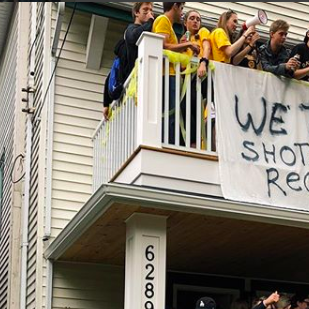
On Oct. 3 last year, Dalhousie University’s President, Richard Florizone tweeted “3. This kind of behaviour is not reflective of our values and disrespectful to our neighbours. Most importantly, it is unsafe.”
His third tweet in a series of five, detailing his reaction to #hoco17 partying.
This year Dal took a varied approach to how homecoming was organized and policed, in the hopes that Homecoming 2018 resulted in better behaviour from the students and a better experience for the surrounding residential community.
Lessons learned
Last year the Dal Student Union had zero involvement in the organization and preparation of homecoming; there was no space for students who were of legal age to drink and enjoy homecoming festivities. This year Dal approached the DSU for a partnership and give them the funds to organize this year’s Black and Gold event, which included a licensed area for 19+ students to drink.
When asked if the wet space was a reaction to what happened in 2017, DSU President Aaron Prosper said “maybe not explicitly but perhaps implicitly it is.”
With the absence of a wet space on campus last year, many students took to the streets surrounding Dal to partake in their own homecoming festivities. The aim this year, says Prosper was “to create a space that students can come have a wet space, but have it in a safe environment.”
By commissioning the DSU to run this event, Dal used them as an extension of themselves; the university itself can’t create a licensed wet space.
“The union is – for the whole university – the designated licensors of alcohol throughout the university. So, if we’re going to have (a wet space) it makes sense that it’s going to go through the union no matter what,” said Prosper.
The event and licensing will also all be funded through Dal, “There was monetary offers to help,” said Prosper, “it’s close to 100 per cent being funded through them.”
Partnership increases police presence
While Dal’s partnership with the DSU is to promote a safe drinking experience, another partnership exists to police the drinking experience.
This year, as with the past 13 years, “Dalhousie’s Designated Police Patrol – an enhanced police presence in the community funded by the university – will monitor and respond to community concerns in neighbourhoods adjacent to the university” reads a press release issued by Dal on Sept. 26.
According to the release, this year the Designated Police Patrol “ will include additional resources, expanded hours, and a proactive approach to managing concerns in the community.” The press release also states that the Halifax Regional Police have been visiting student homes in the surrounding campus area, reminding them of the municipal and provincial laws, potential fines and even criminal charges that they could receive for violations over homecoming weekend.
“With an increased police presence and community outreach initiatives, our focus is on creating a safe and welcoming environment for neighbours and citizens,” says Inspector Dean Simmonds, Central Divisional Commander of the HRP.
The intention of their presence is safety, but the HRP have a complicated relationship with Dal students. 23 off-campus arrests were made during 2017’s homecoming weekend.
The Dalhousie Gazette’s reported the story of a fourth-year student who was held in a cell by the regional police for seven hours during last year’s homecoming. She was arrested for smoking a cigarette on Jennings Street after the house party turned block party was shut down by police, and had to beg for toilet paper, water and blankets while in jail. She was released without a fine or charge.
“I think what Jennings [Street] was trying to do – to provide an area to drink, because Dalhousie doesn’t give that to us,” she said back in 2017, reflecting on the weekend. She thought Dal should’ve provided students with a space to come together and have fun legally.
Dalhousie University communications were unable to schedule an interview with The Dalhousie Gazette before publication deadline.






